Fighting HIV with gene therapy

Professor and Stem Cell researcher Gerhand Bauer debates with a student after a HIV lecture he gave in the Union Ballroom on Tuesday.:Robert Linggi
December 9, 2009
Sacramento State and UC Davis researchers in search of a cure for HIV unveiled promising new research, including creating an HIV-resistant human immune system for mice Tuesday.
Professor Gerhard Bauer, director of the UC Davis Good Manufacturing Practice, said that 33 million people worldwide are infected with HIV. Gene therapy is based on the theory that cells can become resistant to HIV by inserting anti-HIV genes into target cells.
The treatment has many applications, including treatment for different types of cancer and genetic and infectious diseases.
Bauer takes pluripotent stem cells, which come from skin cells, and adds anti-HIV genes to the stem cells. The stem cells are then turned into blood cells and engrafted into patients. The procedure had to be tested on mice first before the FDA would approve testing on humans and is currently being used in clinical trials on people with surprising results.
“This should be able to?suppress or eliminate HIV for the rest of the patient’s life,” Bauer said.
While there are “no absolutes” about the research, Bauer called it promising and “a real armor against HIV.”
“We’re not giving up on a cure for HIV,” Bauer said. “We’re making great progress, and we’ve seen in the past that persistence pays off.”
Senior biology major Amanda Black said that intellectual curiosity and having a family member infected with the virus prompted her to attend the speech.
“We’re all affected, we’re all within this equation,” Black said. “It’s definitely going to give a step up on stem cell research and hopefully broadening people’s eyes.”
Graduate student Steve Tobin has been assisting Bauer in his research, and hopes that they will continue making new discoveries.
“Anything with stem cells now is becoming more prominent, so being able to use gene therapy and stem cells on HIV is promising,” Tobin said.
Senior microbiology major Lia Chase was excited to hear about the clinical trials, as well as the ability to culture new stem cells for patients in less than 24 hours. Chase said that leading a normal life is probably the best thing for a patient battling HIV, so hearing about patients receiving fast treatment was good news for her.
“That’s all a patient wants to do, is get back to their life,” Chase said.
While Bauer said HIV research and treatment has come a long way since its discovery, he is anxious that a cure may not come soon enough.
“I’m impatient with this stuff,” Bauer said. “I want to do it in my lifetime.”















































































































































